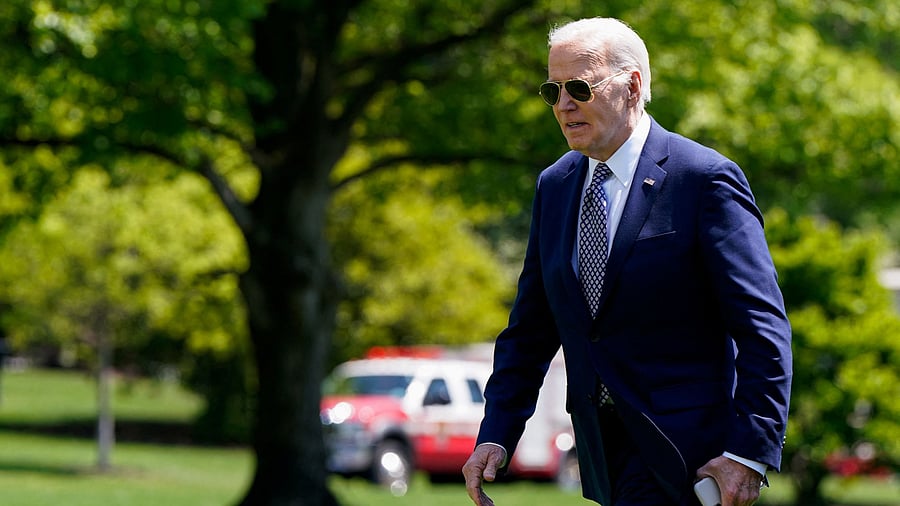
US President Joe Biden walks back to the White House after disembarking from Marine One, Washington, US.
Reuters Photo
The US stands at a critical juncture in history, encountering multiple déjà vu moments simultaneously. A simmering Middle East threatens to divert the US’s focus from the Indo-Pacific, drawing America back to its primary engagement area for much of the last century — the Persian Gulf. Domestically, a volatile atmosphere of protests across college campuses echoes the social and ideological divisiveness of the Vietnam War era. Meanwhile, a resurgence of great power competition with Russia in Europe and globally has emerged. While competition with China may not evoke déjà vu, it certainly amplifies the potency of these threats compared to the last century, when America confronted them.
As the Biden administration grapples with the intricate interplay of domestic pressures and international obligations, particularly in the midst of an election year, there is a palpable sense of urgency to confront a myriad of challenges.
During the preceding week, the US Congress approved four critical pieces of legislation: three distinct aid packages for Ukraine, Israel, and the broader Indo-Pacific region, encompassing support for Taiwan; and a fourth bill issued an ultimatum to ByteDance, the parent company of TikTok, mandating divestment within 270 days or risk a ban on operations within the US. The Biden administration encountered significant pressure to expedite the passage of these bills, given prolonged opposition from Republicans in the House of Representatives and the consequential impact on both domestic and foreign policy agendas.
The Biden administration finds itself entangled in two conflicts at home, both influenced by engagements on foreign soil. The ongoing war in Ukraine has exacerbated an unprecedented partisan divide between Democrats and Republicans, a division likely to intensify leading up to the presidential election in November. Meanwhile, the Israel-Hamas conflict has laid bare a stark generational divide within American society regarding perceptions of Israel and Palestine, setting the stage for a potential cultural war.
The concern over civilian casualties resulting from Israel’s offensive in Gaza, coupled with a surge in antisemitism in the US, has fuelled an impending culture clash within the country. At home, Biden faces pressure to maintain the delicate balance between supporting Israel and promoting peace in the region. His administration’s initiatives, such as creating a floating pier in Gaza for aid delivery and preventing Israel from launching the Rafah offensive, have garnered domestic support, translating into a narrowing poll gap with Trump in an election cycle. However, external factors stemming from the Middle East’s own geopolitical dynamics threaten to erode these gains.
The ongoing Russia-Ukraine war may have added to the domestic political discord in the US. However, there is a distinction in how the Russia-Ukraine war and the Israel-Hamas conflict are unfolding in the US. While the former is being evaluated through a realpolitik lens, the latter is fuelled by religious and cultural sentiments amplified by recent waves of immigration in the US.
A regional red line was crossed for Israel on April 13 when Iran launched over 300 missiles and drones directly targeting Israel. While Israel, along with a coalition of states including Jordan, the UK, and the US, managed to intercept almost all of the missiles, the Middle East now teeters on the edge of regional escalation. Israel’s response appears to have been tempered by US pressure, with President Biden openly stating that the US will not support Israel’s military escalation in the region. However, two factors suggest that the delicate regional balance achieved under US pressure may be at risk: the potential for Israel’s military preparations for the Rafah offensive to reverse temporary gains in regional peace and deepen the Shia-Sunni divide, and the concern that Israel’s relatively restrained response in Isfahan may not have established the deterrence against Iran that it sought. Given the history of shadow wars between Iran and Israel, proxy wars, espionage, cyberattacks, and hit squads cannot be ruled out.
Until now, pressure from Washington has constrained Israel’s response, emphasising the importance of strategic restraint for regional stability. Despite an itch in Israel’s war cabinet, caution prevails when launching a full-scale offensive. The Biden administration’s balancing act, publicly criticising Netanyahu while ensuring support for Israel, reflects the complexity of the situation. Biden’s efforts to mediate a ceasefire in Gaza and provide aid through the air and a floating pier demonstrate an approach aimed at balancing stability in the region while addressing its own domestic political considerations.
In the coming days, the Biden administration’s ability to navigate these challenges will be tested. The stakes are high, with the spectre of conflict looming large and the region’s future hanging in the balance. Perhaps never was the political fortunes of a US president tied so closely to stability and deterrence in the Middle East.
(The writer is Fellow,
Strategic Studies Programme, Observer Research
Foundation, New Delhi)